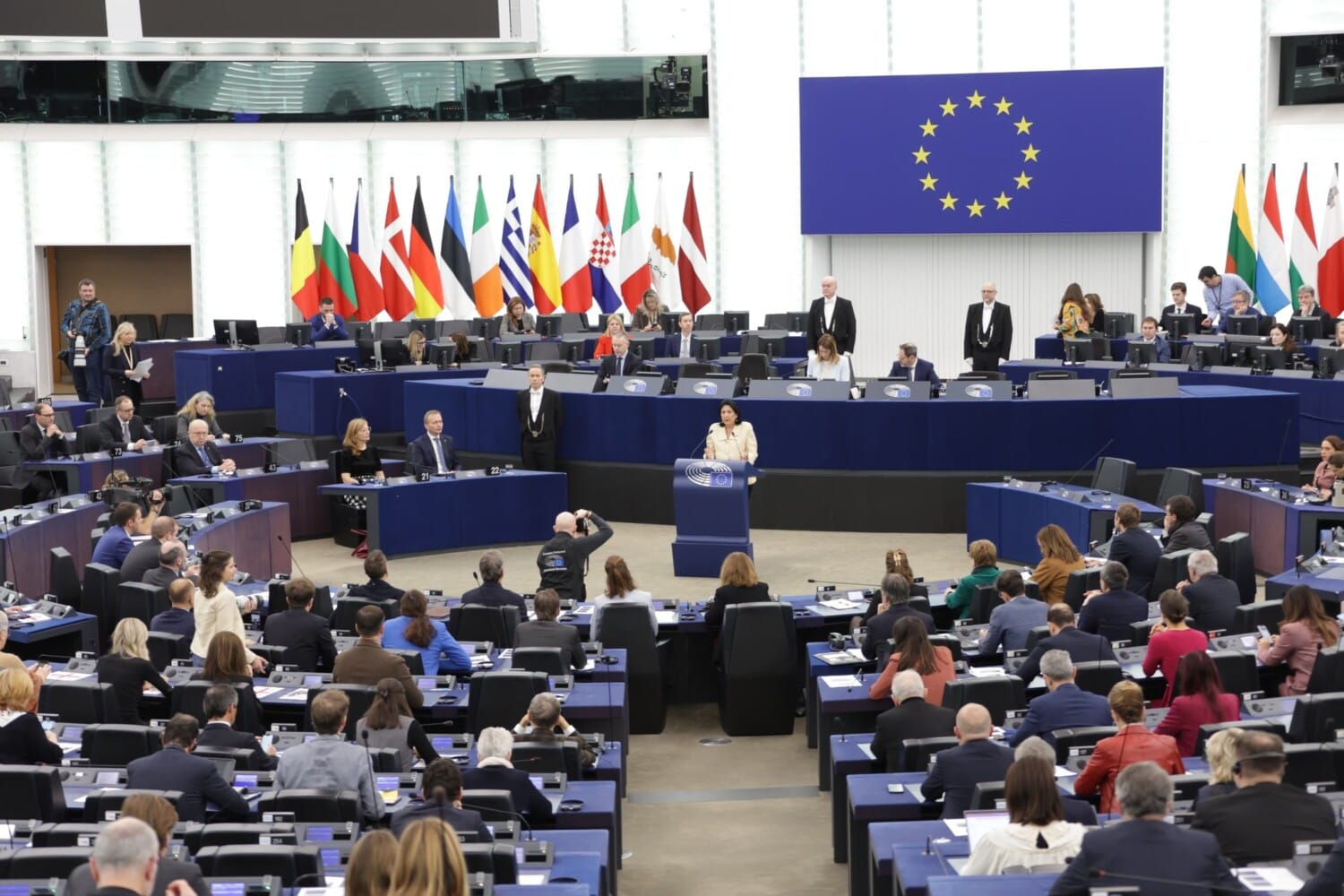After contested parliamentary elections, the Georgian government faces a legitimacy crisis both domestically and internationally. Only two EU member states (Hungary and Slovakia) have extended congratulations to the new administration. Civic protests persist with remarkable determination, driven by widespread frustration over the government’s decision to halt EU accession talks until 2028 and its refusal of EU budgetary support, seen as a major setback to EU integration.
Two months into the crisis, many observers of Georgian politics are questioning the EU’s response.
Will the EU adopt a leading role in addressing the situation, or will it continue with a “wait-and-see” approach?
Initially, Brussels responded cautiously, adopting the latter stance, but its position has gradually evolved. However, a strong unified EU voice remains absent, with divisions persisting—not only among EU member states (though limited to a small minority) but also within EU institutions themselves.
This fragmentation has resulted in a policy marked by hesitation. The EU has neither clearly recognized nor rejected the elections and has taken only limited action, such as imposing visa restrictions on diplomats and government officials. This reluctance stems not only from the transition to a new institutional and political cycle starting this December but also from an often-overlooked factor: the evolving institutional architecture and shifting power dynamics within the Union, which further hinder the formulation of a coherent and decisive policy.
Distinct Narratives Emerging in Brussels
In Brussels, distinct approaches to Georgia are taking shape. The first advocates a hardline stance, emphasizing punitive measures such as personal sanctions against key figures in the Georgian government and the suspension of visa liberalization for Georgian citizens. This camp argues that decisive action is necessary to demonstrate that democratic backsliding is unacceptable for an EU candidate country.
The second approach views Georgia’s challenges through a broader geopolitical lens, cautioning against the EU’s ability to address Georgia’s internal situation amid ongoing crises like Russia’s war in Ukraine. Proponents of this perspective highlight Georgia’s strategic importance and warn that punitive measures could alienate the Georgian public, pushing the country further from the EU’s orbit.
The much-anticipated EU summit held on December 18–19, exposed these tensions. Heated debates marked the preparatory meetings, with advocates of sanctions clashing with those favoring a more pragmatic approach. Discussions were further complicated by opposition from “disruptors” like Hungary and Slovakia, whose populist, pro-Russian leaders argued that sanctions unfairly targeted a conservative government. The EU’s new foreign policy chief, Kaja Kallas, proposed sanctions against individuals involved in the crackdown on protesters, including asset freezes and travel bans. Predictably, Hungary and Slovakia opposed the move, with Kallas remarking that this was her first Hungarian veto but likely not her last.
Changing Institutional Balances in Brussels and Georgia
One often-overlooked factor in analyzing the EU’s response – and understanding the mismatch in narratives – is the evolving nature of EU institutions.
The European Parliament has emerged as a prominent voice on Georgia’s situation, despite its limited powers in EU foreign policy. Both before and after Georgia’s elections, the Parliament adopted critical resolutions. While these resolutions carry no legal weight, they reflect the Parliament’s institutional logic: a desire to expand its influence over EU foreign policy, traditionally dominated by national governments.
However, MEPs’ efforts to align with political groups, local parties, or EU norms often result in conflicting objectives. This dynamic can entangle the Parliament in national politics, a risk it must carefully navigate. Georgia serves as a case in point, where MEPs have leveraged the situation to promote EU norms and values while simultaneously advancing the Parliament’s institutional interests. This, however, can clash with the broader institutional balance within the EU.
While statements and resolutions from MEPs are welcomed by many in Georgia, frustrations arise when these declarations are not followed by concrete actions from other EU institutions. A notable disparity often exists between the Parliament’s rhetoric and the positions adopted by other EU bodies, leaving Georgians disillusioned with the lack of unified and actionable support.
The European Council has increasingly taken center stage in high-profile foreign policy decisions, overshadowing the role of the Foreign Affairs Council. This shift has been reinforced by the Lisbon Treaty, which granted the European Council a stronger legal mandate to make critical decisions in foreign and security policy. The rise of populism and the emergence of challenger governments within the EU have compelled the European Council to assert a dominant role in external actions.
This trend reflects a broader rebalancing of authority between supranational and intergovernmental institutions, with the latter exerting growing influence over the EU’s foreign policy. The Hungarian and Slovak vetoes further underscore a broader shift in the EU’s consensus-driven decision-making culture. What was once a process aimed at fostering compromise and unity is increasingly exploited by populists and skeptics to block collective EU action, undermining the principles on which it was originally founded. For Georgia, the dominance of intergovernmental logic suggests that the EU will face significant challenges in addressing the crisis as a unified actor.
The European Commission, as both an executive and legislative body managing external instruments, is expected to expand its influence in the new institutional cycle. The European Commission body responsible for enlargement, the Directorate-General for Neighbourhood and Enlargement Negotiations (DG NEAR), under the new leadership of Marta Kos, is poised to play a pivotal role by prioritizing strategic communication, enhancing its public profile, and building support among EU citizens and policymakers for enlargement and neighborhood policies. Leveraging its recognized expertise and institutional memory, DG NEAR is well-placed to become a key actor in shaping the enlargement process, transitioning from a technical body to a more politically influential entity.
For Georgia, these evolving dynamics highlight the critical need for enhanced coordination among EU institutions. The various actors involved often pursue divergent objectives, operate under distinct legal frameworks, and are driven by differing motivations. Without a unified strategic framework rooted in interinstitutional consensus, the EU’s response to Georgia’s crisis risks becoming disjointed and ineffective.
The Coalition of the Willing: A Likely Path Forward?
Given these dynamics and the need to reconcile differing logics, the EU has emphasized the importance of investigating the contested election results and addressing the detention of protesters. A technical mission, likely conducted in collaboration with the OSCE/ODIHR, is anticipated to launch by early January 2025.
However, its scope and mandate will largely hinge on domestic developments in Georgia, particularly the government’s handling of protests and its approach to the conclusion of President Zourabichvili’s term. The delayed deployment of this mission, however, underscores the EU’s hesitation and lack of a coherent strategy, sending a troubling signal.
Looking ahead, coalitions of willing states may take the lead in imposing measures against the authoritarian drift of the Georgian Dream party. This concept of a “coalition of willing states” is not new in EU foreign policy. Similar approaches were used during the Kosovo intervention in 1999, the sanctions on Belarus in 2020, and the establishment of the cyber sanctions regime in 2019. A comparable strategy could emerge for Georgia, where like-minded states and EU leaders spearhead actions such as sanctions or bilateral diplomacy to address the crisis.
At the same time, Brussels recognizes that punitive measures alone cannot provide a long-term solution. Many in Brussels believe that a sustainable resolution must be driven by responsible domestic actors within Georgia.
The EU Must Act
The urgency and reality of the situation demand that Brussels act decisively and without delay. The EU has a responsibility to address Georgia’s crisis with the seriousness it requires. The costs of inaction—both strategic and reputational—could not be higher. In politics, timing is everything, and now is the EU’s moment to act. Sooner or later, the Union must articulate a clear and unified position on Georgia.
The civil protests in Georgia, driven by genuine grassroots movements, cannot be ignored.
Their momentum reflects a widespread demand for democratic values and European integration. Failing to engage risks allowing the crisis to escalate further. As the saying goes, “it takes two to tango”—external support from the EU must complement domestic pressure.
The EU must decide on critical issues: recognition or non-recognition of the contested elections, the terminology it uses, the scale of its diplomatic engagement, and, ultimately, a cohesive strategy for Georgia. Without coordinated external pressure and a strategy, the crisis is likely to persist and deepen, with far-reaching consequences for both Georgia and the EU.
A failure to act decisively risks not only jeopardizing Georgia’s European aspirations but also alienating its youth and its predominantly pro-European population. Georgia is a nation that has the potential to be a vital part of the EU’s future. Brussels must not let this opportunity slip away, or it will lose a crucial partner and a beacon of European values in the strategic region.
Dr. Teona Lavrelashvili
Brussels based expert in EU affairs with over a decade of experience in EU institutions, academia, and think tanks, holds a Ph.D. in Political Science from KU Leuven. She is a Visiting Fellow at the Martens Center, teaches at Sciences Po Strasbourg, and serves as President of the College of Europe Alumni Association.




